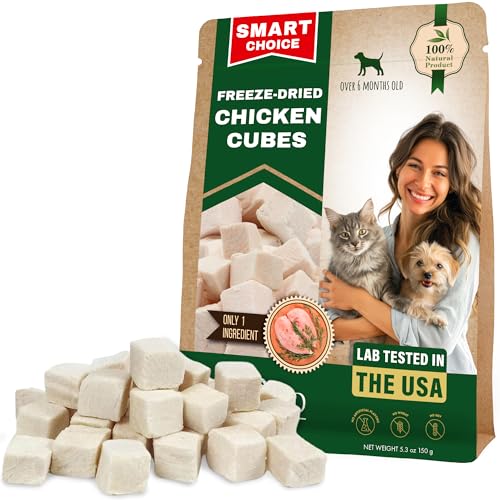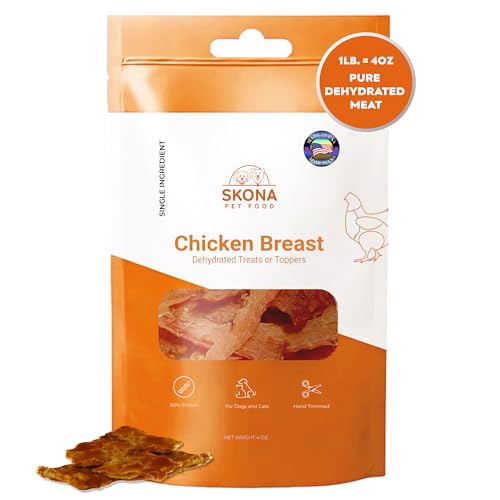Can Cats Eat Dog Jerky?
If you’re a cat lover, you probably want to treat your feline friend to something special from time to time. But when it comes to dog jerky, you need to think twice before sharing it with your cat. While dogs may enjoy this tasty treat, it’s not the best choice for our purr-fect companions. Here’s why:
- Different Nutritional Needs: Cats have unique dietary requirements compared to dogs. They need more protein and essential nutrients like taurine to thrive. Dog jerky, on the other hand, is formulated to meet the nutritional needs of dogs, not cats. Feeding your cat dog jerky regularly could lead to nutritional imbalances over time.
- Possible Allergies: Cats can develop allergies to certain ingredients found in dog jerky. Common allergens like chicken, beef, or grains may cause digestive issues or allergic reactions in cats. It’s best to stick to cat-specific treats that are formulated to be safe for your furry friend.
- Safety Concerns: Dog jerky can pose a choking hazard for cats. The texture and size of dog jerky may be difficult for cats to chew and swallow properly. Additionally, some dog jerky products may contain bones or other hard components that could harm your cat’s delicate digestive system.
- Potential Toxicity: Certain dog jerky treats may contain additives, preservatives, or seasonings that are safe for dogs but toxic to cats. For example, some dog jerky products contain onion or garlic powder, which can be harmful to cats when consumed in large quantities.
- Consult Your Vet: It’s always a good idea to consult with your veterinarian before introducing any new treats or food into your cat’s diet. They can provide personalized advice based on your cat’s health, age, and specific dietary needs.
Remember, there are plenty of cat-specific treats available that are formulated to meet your cat’s unique nutritional needs and taste preferences. Stick to these treats to ensure your cat stays healthy and happy. Your feline friend will thank you for it!
So, despite your dog’s love for jerky, it’s best to keep this treat out of reach from your curious cat. Opt for cat-friendly alternatives that are designed to meet their specific needs.
Understanding Cats’ Dietary Needs
As a cat lover, you know that cats are unique creatures with specific dietary needs. Just like humans and dogs, cats require a balanced diet to stay healthy and thrive. Feeding them the right food is essential to ensure their well-being.
Cats are obligate carnivores, meaning their bodies are designed to primarily eat meat. They need a diet rich in animal-based protein, as well as essential amino acids like taurine and arginine. These nutrients are crucial for their growth, muscle development, and overall health.
Unlike dogs, cats cannot produce certain vital nutrients on their own. For example, they cannot convert the amino acid called “taurine” from other sources, so it needs to be included in their diet. Without enough taurine, cats can develop serious health issues, including heart problems and vision loss.
Furthermore, cats have a higher protein requirement than dogs. Their bodies have evolved to absorb and utilize protein more efficiently. This is why it’s important to feed them food that meets their specific nutritional needs.
Feeding your cat dog jerky treats on a regular basis may not provide them with the right balance of nutrients. Dog jerky is formulated to meet the nutritional needs of dogs, which are different from cats. It can create imbalances in their diet, leading to deficiencies or excesses of certain nutrients.
Moreover, some dog jerky treats contain ingredients that cats can be allergic to. Cats can develop food allergies, and feeding them dog jerky treats may increase the risk of triggering an allergic reaction. It’s best to stick to treats that are specifically formulated for cats to avoid any potential allergic issues.
In addition, dog jerky treats can pose a choking hazard for cats. They are usually larger and tougher than cat treats, making them difficult for a cat to chew and swallow safely. This can lead to digestive issues or even an obstruction in their gastrointestinal tract.
To ensure your cat’s health and well-being, it’s always recommended to consult with a veterinarian before introducing any new treats or food into their diet. Your vet can provide guidance on the right type of treats that meet your cat’s dietary needs and help you avoid any potential health risks.
Remember, your cat relies on you to make the best choices for their nutrition. By understanding their dietary needs and providing them with appropriate food, you’re ensuring their happiness and longevity.
The Risks of Feeding Cat Dog Jerky
As a cat lover, you want the best for your feline friend. You may be tempted to give them a treat like dog jerky, but it’s important to understand the risks involved.
Nutritional Imbalances and Deficiencies
Cats are obligate carnivores, meaning they primarily rely on animal-based protein for their nutritional needs. They require specific amino acids, such as taurine, which are essential for their overall health. Dog jerky treats may not provide cats with the right balance of these essential nutrients, leading to nutritional imbalances and deficiencies.
Potential Allergies
While your dog may enjoy dog jerky, cats have different dietary requirements and can be allergic to certain ingredients found in these treats. For example, some dog jerky products contain ingredients like garlic and onion, which are highly toxic to cats. Feeding your cat dog jerky regularly may put them at risk of developing adverse reactions or allergies.
Choking Hazards
Dog jerky treats are typically larger and harder compared to treats made specifically for cats. Cats have smaller jaws and throat, making them more prone to choking hazards. The size and texture of dog jerky treats can pose a significant risk to their health and safety.
You always want to prioritize your cat’s well-being. That’s why it’s crucial to consult with a veterinarian before introducing any new treats or food into their diet. They can provide guidance on suitable alternatives and ensure your cat’s dietary needs are met.
Remember, there are plenty of treats specifically formulated for cats available in the market. These treats are made with the right balance of essential nutrients and are designed to meet their unique dietary requirements.
By being mindful of the risks and choosing treats that are safe and appropriate for cats, you can ensure your feline friend stays healthy and content. So, let’s give them the love and care they deserve by making informed choices when it comes to their diet and treats.
Keep reading to learn more about cat food and find out what you should look for when choosing the best options for your furry companion.
Alternatives to Dog Jerky for Cats
When it comes to spoiling your beloved feline friend with treats, you want to make sure you’re giving them something that suits their unique dietary needs. While dog jerky may seem like a tempting option, it’s important to remember that cats have different nutritional requirements. Let’s explore some alternatives that are both tasty and safe for your feline companion:
- Cat-Specific Treats: Look for treats that are specifically formulated for cats. These treats are made with ingredients that cater to the nutritional needs of our feline friends. They often contain high-quality proteins like chicken or fish, which are essential for maintaining a healthy diet. You’ll find a wide variety of flavors and textures to choose from that your cat will love.
- Freeze-Dried Meat: Another great option is freeze-dried meat treats. These treats are made by removing the moisture from meat, which helps retain the natural flavors and nutrients. They are a great source of protein and can be a tasty alternative to dog jerky. Make sure to check the packaging for any added preservatives or fillers, and opt for 100% meat treats whenever possible.
- Homemade Treats: If you enjoy cooking, why not try making your own cat treats? There are plenty of simple recipes available online that use cat-friendly ingredients like chicken, tuna, or even pumpkin. By making treats at home, you have full control over the ingredients and can cater to any specific dietary needs or allergies your cat may have. Just make sure to consult with your veterinarian before introducing any homemade treats into your cat’s diet.
Remember, when introducing new treats to your cat, it’s important to do so gradually. Start by offering a small amount and observe how your cat reacts. If they enjoy the treat and show no signs of digestive upset or allergies, you can gradually increase the portion size.
Conclusion
When it comes to treating your cat, it’s important to choose the right snacks. While dog jerky may be tempting, it’s not the best option for your feline friend. Instead, look for treats specifically designed for cats. These treats are formulated with high-quality proteins like chicken or fish, providing your cat with the nutrients they need. Another alternative is freeze-dried meat treats, which retain the natural flavors and nutrients that cats love. If you’re feeling adventurous, you can even make homemade treats using cat-friendly ingredients. Just remember to introduce new treats gradually and monitor your cat’s reaction. By selecting the right treats, you can ensure that your cat stays happy and healthy. So next time you’re shopping for snacks, remember to choose treats that are purr-fectly suited for your feline companion.
Frequently Asked Questions
Q: What are some alternatives to dog jerky treats for cats?
A: Look for treats formulated for cats that contain high-quality proteins like chicken or fish. Freeze-dried meat treats are another option as they retain natural flavors and nutrients. Homemade treats using cat-friendly ingredients are also a possibility. Remember to introduce new treats gradually and monitor your cat’s reaction.

















